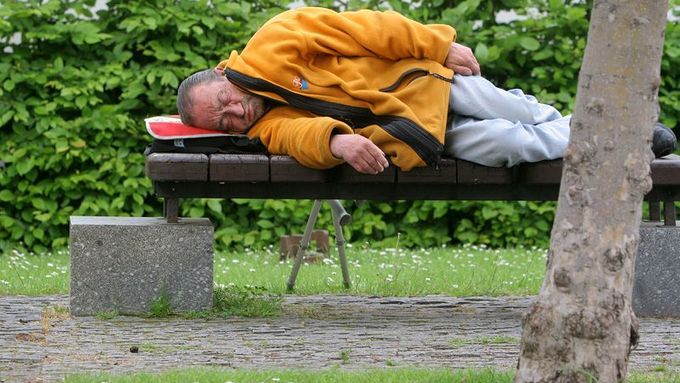EUROPE, CAN YOU SMELL US? What represents the Czech Republic more (if you do not count beer, crystal and ice hockey) - a sugar cube or smelly cheese?
Coalition MP Jan Březina thinks it is definitely the latter. So he has recently come up with a new idea for the Czech Republic's upcoming EU presidency promotion campaign - use smelly cheese from the town of Olomouc (known as Olomoucké tvarůžky) instead of sugar cubes, chosen for the ongoing campaign.
The bittersweet ad featuring Czech celebrities and a sugar cube has earned lots of criticism among Czech lawmakers and its opponents would like to stop the campaign entirely.
"Europe will get to feel/smell us" should be the new slogan according to Březina. Promoting "tvarůžky" would also help Czechs win the fight over its register trademark in EU, he believes.
**
CZECH MEN, STAND UP FOR YOUR RIGHTS. While Březina would like to use smelly cheese to promote the country´s battle over its registration with EU, Czech men would like to use the EU presidency to promote their own rights.
The Association of Czech Men would like to see a committee dedicated entirely to (Czech) men's rights, which would serve as a counterpart to the existing Committee for Women's Rights and Equal Opportunities.
The association argues that the Committee for Women's Rights employs only one man alongside 39 women and all they care about are women´s rights. Thus, Czech men are being discirminated against.
**
THE GERMAN DREAM FOR CZECH HOMELESS. While Czech police treat homeless people as thieves and deny it (see Aktuálně.cz´s January report), German police seem to enjoy their company.
Czech homeless man Pavel L. was a popular character among the inhabitants of Mannheim in south-west Germany, greeting the local police "Hi, pals, howz it going?". So when he passed away last week (dranking himself to death at the age of 33), Mannheimers were truly sorry.
Pavel´s friends created a little memorial for him at the place where he used to spend time, on the Willy Brandt Square.
Germany is still considered by many Czechs, Poles and other Central Europeans to be a relatively prosperous country worthy of pursuing one's dreams. And now, even the homeless seem to agree.
**
NO MORE TRIALS WITH FORMER COMMUNIST COLLABORATORS. Former prosecutor Ludmila Brožová-Polednová was probably the last person to face a trial out of all people involved in infamous political show trials in the 1950s.
"There is 99 percent certainty that this is the last case. Currently, we are not working on any other related lawsuits," says Jan Srb, spokesperson of The Office for the Documentation and the Investigation of the Crimes of Communism Police of the Czech Republic.
The 1950s in Czechoslovakia saw dozens of "butchers" who were involved in the Communist Party's witch hunt. According to Srba, only three of the former judges and prosecutors were called to answer for their deeds.
According to historian Tomáš Bursík it is a little late to punish the crimes of communism now. But it is not late to prove people guilty.
"It is a little late for punishments and legal proceedings. But I still believe that it is not too late for the Czech society and future generations to say that there were crimes committed in the name of communist ideology," Bursík said.
**
RELEASE BROŽOVÁ-POLEDNOVÁ! Attorney Renata Vesecká shares a similar view with historian Bursík.
She asked President Václav Klaus to pardon 86-year-old Ludmila Brožová-Polednová, former Communist prosecutor who was sentenced to six years in prison, backing her plea with humanitarian concerns.
"I don't want contemporary justice to behave in the same way as in the 1950s and imprison an elderly person," said Vesecká to Právo daily. According to her, putting Brožová-Polednová on trial was enough to reach moral justice.
**
THREE TYPES OF CZECH ROMA. Controversial Czech politician Jiří Čunek (Christian Democrats) has come up with a plan to dissolve ghettos in Czech towns and cities.
Čunek plans to divide its inhabitants into three groups, based on their chances to start living outside of a ghetto.
These groups would classify people as 1.) independent, 2.) dependent and 3.) irresponsible. See the details in our report, which includes (Čunek´s) detailed chart.
Roma organizations do not approve of the draft which is based on a selection. "We see it as yet another clero-fascist behavior of Deputy Prime Minister," said Ivan Veselý, Deputy Leader of the Government Council for Roma Issues.
**
MANY EXPELLED GERMANS RESISTED HITLER. After World War II ended, President Edvard Beneš and the Czechoslovak government decided that Germans from the borderland areas called Sudetenland would be expelled from the country.
Heavily German-populated Sudetenland regions were hotbeds of pro-fascist movements appearing in the late 1930's, and many Czechs saw the Germans living there as traitors who supported the Third Reich in taking Czechoslovak sovereignty after the Munich Agreement of 1938.
Now, a report from a three-year government project concerning the fate of Sudeten Germans says a good number of the Germans actively resisted Hitler's regime.
But that did not make any difference for many, if not most, Czechs who treated the departing Germans with disdain and often cruelty. History is often merciless, indeed.












